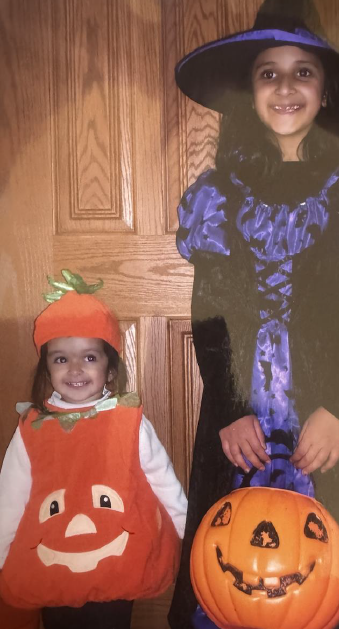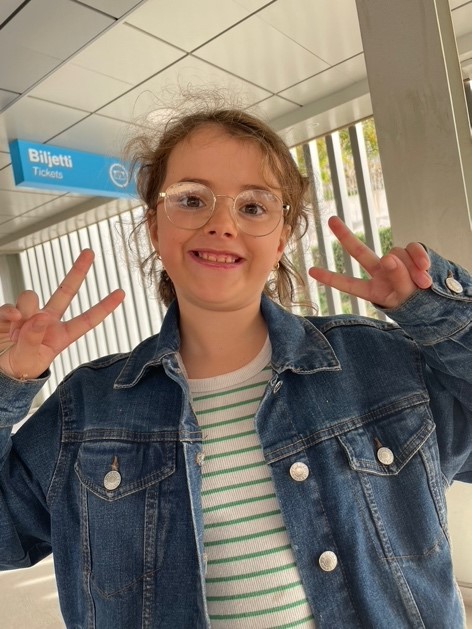My head of year told me to ‘just stop thinking of water and the thirst will go away – it is all in your head’ when I was eleven and newly-diagnosed with diabetes insipidus (now known as AVP deficiency). I had been diagnosed with panhypopituitarism at three years old, when an MRI scan at Great Ormond Street Children’s Hospital showed that my pituitary gland was smaller than average and positioned higher than expected. Each hormone deficiency emerged in staggered stages of my life between the ages of three and fourteen.
My early primary-school years were spent gazing longingly out of the medical room window at my peers playing outside in winter, when it was ‘too risky for me to go out and catch a cold’, or in summer, when it was ‘too risky for me to go out and have my cortisol levels drop’.
My early primary-school years were spent gazing longingly out of the medical room window at my peers playing outside in winter, when it was ‘too risky for me to go out and catch a cold’, or in summer, when it was ‘too risky for me to go out and have my cortisol levels drop’. My main developmental years were marked by isolation from children my own age and by being treated as though I were made of glass. Because pituitary conditions are so rare, no one really understood or took the time to educate themselves on what I was facing. While I appreciated the need for caution, by the time I entered secondary school I had developed a distorted, degrading and vulnerable view of myself—far from the truth. If you are reading this, you’ve already taken the first step towards educating yourself and ensuring that no other child is treated this way, but rather told they can achieve anything, even with a pituitary condition. Here is my story of secondary school and beyond with panhypopituitarism.
I have always loved secondary school, sixth form and now university, because I spent so many days from seven years old lying in a hospital bed, wishing more than anything to be at school like other children. Therefore, I never viewed school negatively. What I struggled with was recognising what I was capable of achieving.
I kept my medical condition a secret in secondary school because my primary-school reputation was that of the ‘sick girl’ who was always collected from class to take her medications, or ‘lucky enough’ to be sent home in the middle of the day because another child had vomited and it was deemed ‘dangerous’ for me to be exposed. Only my teachers knew about my condition, but I always felt that knowledge was passive. They would simply nod when I explained my situation and then forget about it a few weeks later when I had to justify another absence.
At last, my science teacher appeared to understand my explanations, and I was so excited to be heard—until she laughed and muttered, ‘How do you expect to stay in the top biology set with a condition where you cannot produce adrenaline? Clearly this will be too strenuous for you.’ I frequently participated in class and had high grades, but I was moved to a lower set solely because of my chronic illness. I was devastated—academics meant so much to me—but I decided to prove her wrong. I walked into the lower set with my head held high and worked so hard that I was eventually called aside by the Head of Department, who told me my exceptional grades proved I belonged in the top set. While it was thrilling to be vindicated, the fact that this even had to happen baffled me then and still baffles me now.
The doubt about my abilities persisted when the careers adviser told me to ‘aim lower’ because my adrenal insufficiency would limit my achievements. It went further: when my cortisol levels dropped (leaving me unable to move or speak until given hydrocortisone), teachers were clueless despite having my care plan. Everyone told me I could not do it, and my hospitalisations and sick days made me believe them. I remember the frustration—I wanted nothing more than a normal life. I believe that this is a pain only teenagers with chronic illness can truly understand. I looked to the past—I had my condition. I looked at the present—I still have it. I looked to the future—I will live with it. It was consuming and inescapable. I often felt like a burden, alongside the helplessness of not controlling my own body when it crashed.
I looked to the past—I had my condition. I looked at the present—I still have it. I looked to the future—I will live with it.
My GCSEs were affected by my health, but I still achieved good grades and changed schools for sixth form—the best decision I ever made. I was supported wonderfully by all the staff, and I no longer hid my condition; I began raising awareness. I completed an EPQ on the link between invisible medical conditions and mental health and was astounded by my findings on the power of the mind to improve health. I realised I could not control my condition, but I could control my response to it. Easier said than done, of course: two roller-coaster years were needed before I genuinely believed what I kept telling myself.
I hosted events, published a blog and even spoke on a podcast about living with a chronic illness, receiving messages from people with similar experiences who finally felt heard. Suddenly, my pain had purpose. I founded the Young People’s Support Group at The Foundation so that other young patients with a pituitary condition could have the role model I never had. I finished my A-levels and now attend King’s College London, studying Neuroscience with Psychology. While I’ve become more private about my condition, I now have proof that I can achieve anything, and my progress is my motivation. My condition has gifted me what many search for their entire lives: purpose. The qualities and insights I possess allow me to see beauty in the mundane. I know life is more than grades on paper or approval from others.
Every day I am grateful for my condition, because without it I would not be who I am now. If you have a pituitary condition and are told you can’t do what others can, or view yourself as inferior to peers, remember that you have a unique perspective and great resilience. I always hated it when people said, ‘You are so strong’, because the truth is, we have no choice but to be. However, the extent to which you remain strong is in your hands, and I hope seeing me adapt rather than succumb to my condition over sixteen years gives you the inspiration to do the same.
The main message of this blog is to be kinder to yourself—because you can do so much with the lessons you learn from living with a pituitary condition. Thank you for reading my story; I hope it inspires you to tell yours, or at the very least to reframe it in a more positive light.

See more from Aleha
As well as running our Young People’s Support Group, Aleha also runs the Young People’s Support Group social media account, which you can find on Instagram at @young.people.support.group. She also regularly contributes to our Tik Tok and other social media channels!

Join our Young People’s Support Group
Aleha now successfully runs our Young People’s Support Group, open to anyone aged 18 – 30 affected by a pituitary condition. You can see more about the group and sign up, below.
Join the group








